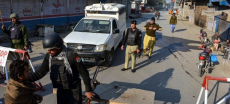[vc_row][vc_column][vc_column_text dp_text_size=”size-4″]The National Corruption Perception Survey 2023 by Amnesty International Pakistan reveals that police, tendering and contracting, and the judiciary are perceived as the most corrupt institutions at the national level. The survey, conducted by Transparency International, classifies the frequency of corruption perceived by citizens across all four provinces. The findings, released on International Anti-Corruption Day, underscore the widespread menace of corruption in Pakistan, a country grappling with economic crises and political turmoil.
The report identifies police, judiciary, education, and health departments as the top four most-corrupt institutions. Other institutions with notable corruption perceptions include local government, land administration, and Customs, Excise, and Income Tax departments. The survey was conducted from October 13 to October 31, with 1,600 participants.
Read more : Corrupution Allegations Lead To Arrest Of PTI Leader Asad Qaiser
In Punjab, the most populated region, police received the highest bribe (Rs21,186), while in Khyber Pakhtunkhwa (KP), the judiciary saw the highest average bribe paid (Rs162,000).
The majority of Pakistanis expressed the belief that anti-corruption watchdogs, including the Federal Investigation Agency (FIA) and Anti-Corruption Establishments, are often used for political victimization and fail to perform their basic functions.
Over 75% of respondents felt that the private sector holds too much power and influence. Nationally, 40% identified a lack of merit as the primary cause of corruption, while others attributed corruption to the misuse of state institutions by bureaucracy for personal gains.
These findings align with previous years’ results and underscore the persistent challenge of corruption in Pakistan. Addressing corruption remains crucial for the country’s development and stability, requiring comprehensive efforts to strengthen institutions, promote transparency, and hold those engaged in corrupt practices accountable.[/vc_column_text][/vc_column][/vc_row]











